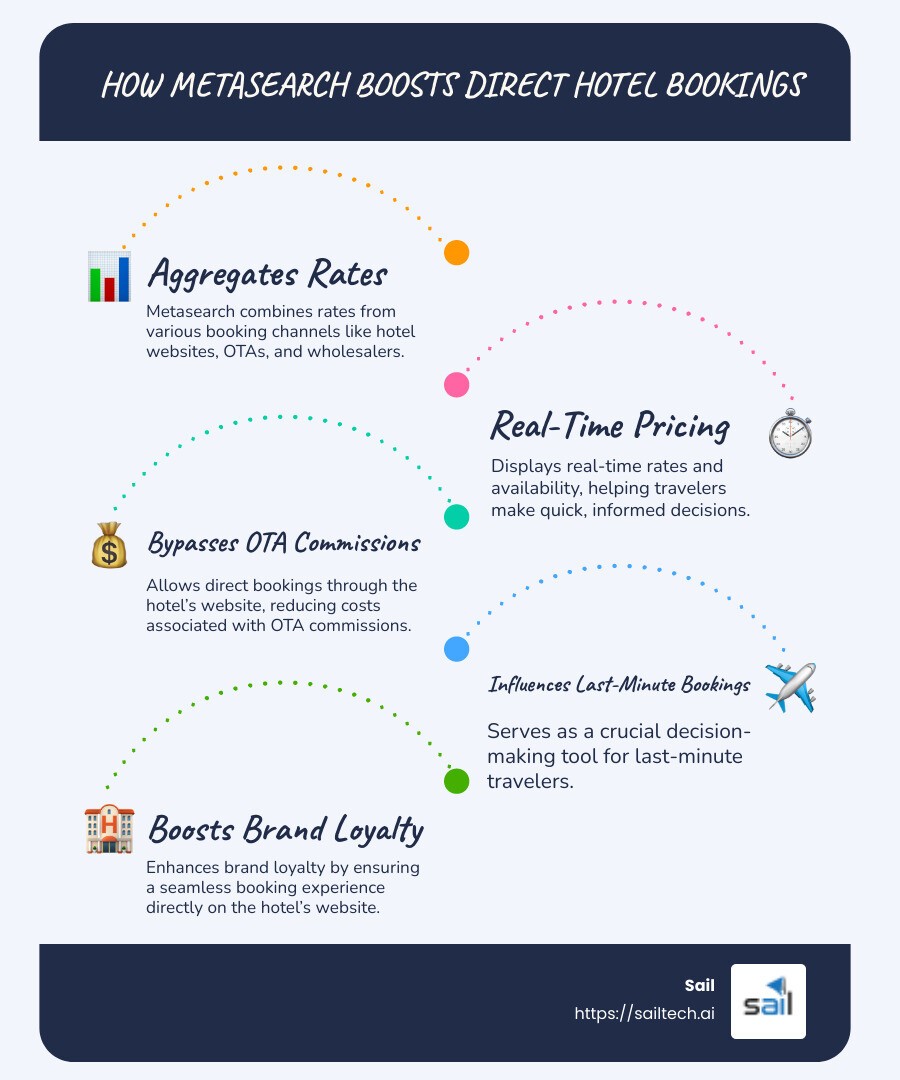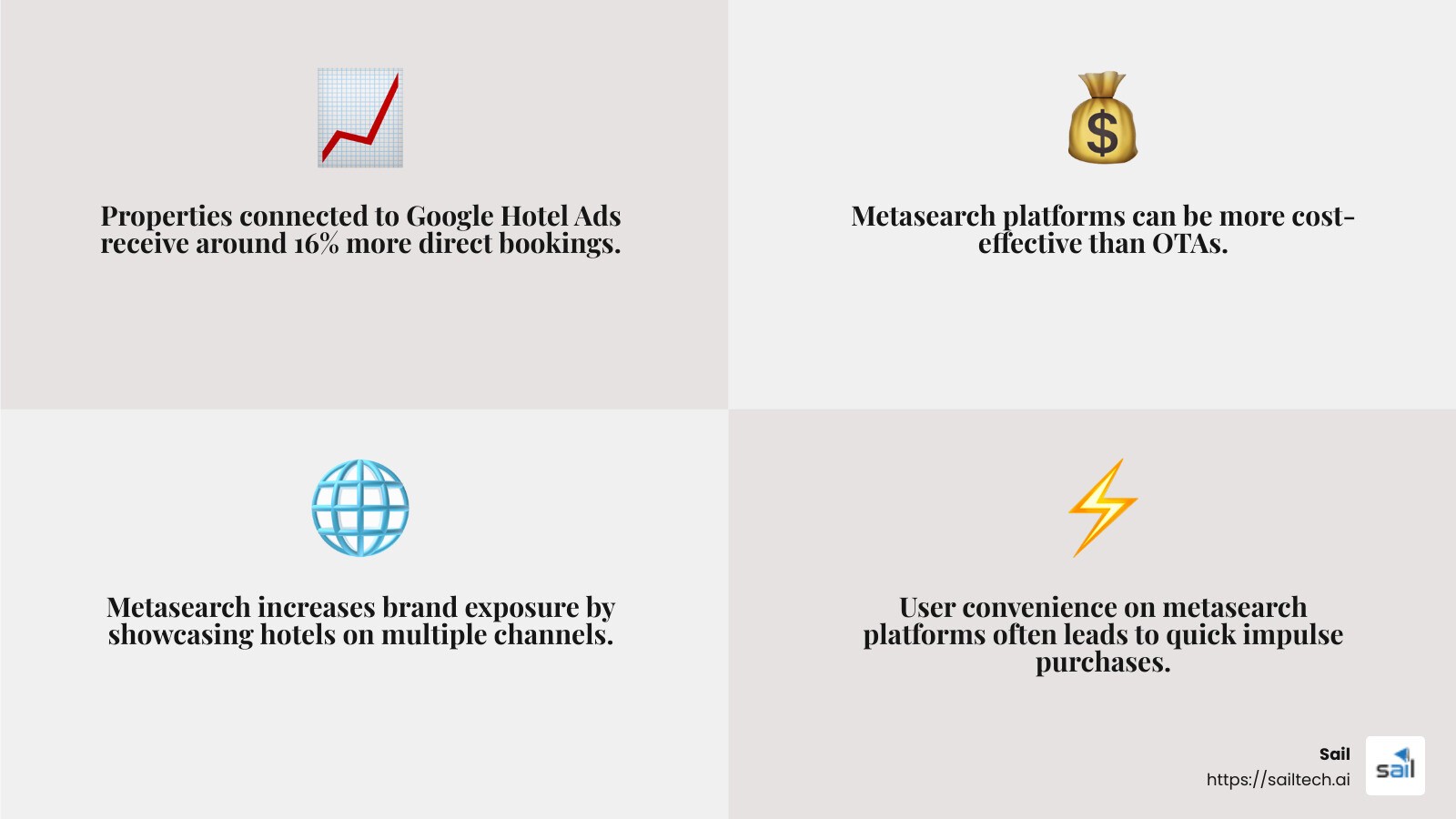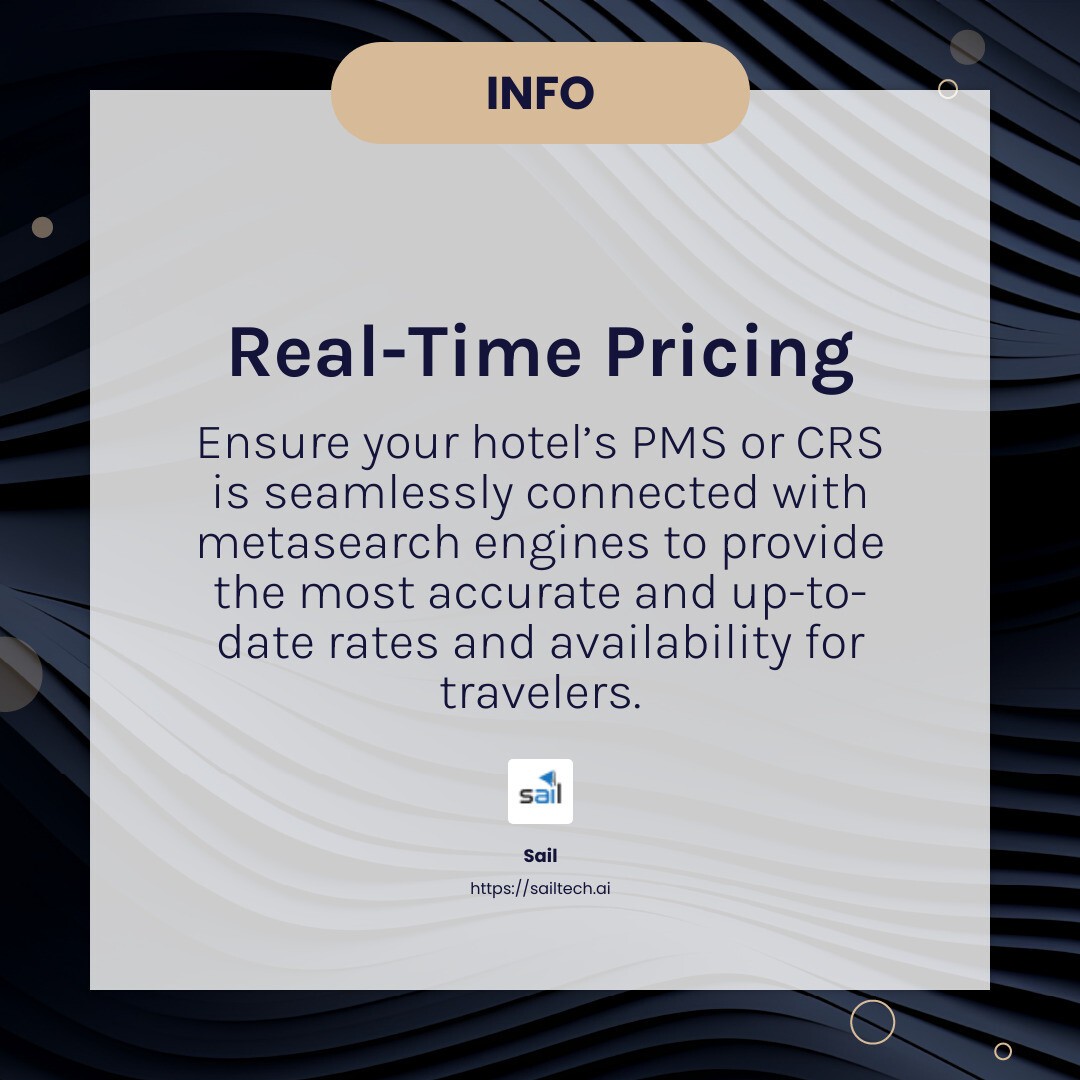Blogs /
Direct Bookings & Conversion
As travel demand evolves, hotel marketing is no longer just about visibility—it’s about being discovered where booking decisions are made. This report explores how search, social, and AI are reshaping guest acquisition.
What is metasearch for hotels? Simply put, metasearch is a tool that aggregates rates and availability from different booking channels—such as hotel websites, OTAs (Online Travel Agencies), and wholesalers—into one easy-to-view comparison. This helps travelers find the best deals quickly and conveniently. For hotel managers, knowing what is metasearch for hotels is crucial because it can significantly boost direct bookings and reduce reliance on costly OTAs.
Why it's important:
Metasearch consolidates real-time hotel rates and availability.
It allows direct bookings through the hotel’s own website, bypassing OTA commissions.
It influences last-minute travelers in their final booking decisions.
The metasearch platform also serves as a mid-to-low funnel marketing tool, making it critical in converting browsing travelers into paying guests during their final decision-making stage. Notably, prominent metasearch engines account for a significant share—85%—of the overall metasearch traffic, demonstrating their influence in the hospitality market.
By actively participating in metasearch, hotels can outbid OTAs and secure top positions in search results. This ensures potential guests are more likely to book directly from the hotel’s website, which in turn, consolidates brand loyalty and provides better upsell opportunities.
My name is Shahar Rubin, founder and CEO of Sail. With a background in elite tech units and successful startups, I've dedicated the past years to leveraging AI in the hospitality sector, driving direct bookings and optimizing hotel marketing strategies.

What is Metasearch for Hotels?
Metasearch for hotels is a powerful tool that aggregates rates and availability from various booking channels into a single, easy-to-view comparison. This helps travelers quickly find the best deals and make informed decisions. For hotel managers, understanding what is metasearch for hotels is crucial because it can significantly boost direct bookings and reduce reliance on costly OTAs.
How Does Metasearch Work?
Metasearch engines compile real-time data from different booking sources, including hotel websites, OTAs, and wholesalers. Here’s how it works:
Search Queries: Travelers input their destination, dates, and preferences.
Aggregation: The metasearch engine collects live rates and availability from multiple channels.
Dynamic Rates: Hotels provide dynamic rates that match current pricing, ensuring travelers see the most up-to-date information.
Integration: This requires seamless integration with the hotel's booking engine and the metasearch platform.
Bidding Logic: Hotels bid for top positions in search results. Each metasearch engine has its own unique ranking and bidding logic.
This process ensures that travelers can compare options easily and book directly through the hotel’s website, bypassing OTA commissions.
Benefits of Metasearch for Hotels
Using metasearch for hotels comes with several advantages:
Direct Bookings: Metasearch drives travelers to book directly on the hotel’s website, reducing dependency on OTAs and their high commission fees. Properties connected to metasearch platforms see around 16% more direct bookings.

Cost-Effective: Metasearch platforms often operate on a pay-per-click model, meaning you only pay when a user clicks on your listing. This can offer a higher return on investment compared to traditional advertising.
Brand Exposure: By appearing in metasearch results, hotels can increase their online visibility and reach a wider audience. This is especially beneficial for small properties looking to compete with larger OTAs.
User Convenience: Travelers find metasearch engines convenient as they provide a consolidated view of all available options, making it easier to compare and choose the best deal.
Impulse Purchases: Metasearch influences last-minute travelers who are ready to book, converting them into paying guests during their final decision-making stage.
By leveraging metasearch, hotels can improve their marketing strategies, drive more direct bookings, and ultimately increase their revenue.
Key Features of Metasearch Engines for Hotels
Real-Time Pricing and Availability
Real-time pricing and availability are essential for any hotel looking to succeed on metasearch platforms. When a traveler searches for a hotel, they expect to see the most up-to-date rates and room availability. This accuracy is crucial for building trust and ensuring a smooth booking experience.
Imagine a traveler finds a great rate on your hotel through a metasearch engine, but when they click to book, the rate is no longer available. This discrepancy can lead to frustration and lost bookings.
Integration with hotel systems is key. Your hotel's property management system (PMS) or central reservation system (CRS) should seamlessly connect with metasearch engines to ensure real-time updates. This not only helps in maintaining accuracy but also boosts your hotel's credibility.

Consistent Rates Across Channels
Rate parity, or consistent rates across all booking channels, is another crucial factor. If travelers see different rates for the same room on different platforms, it can erode trust and hurt your hotel's reputation.
To maintain rate parity:
Monitor your rates: Regularly check to ensure that your rates are consistent across all platforms.
Use a channel manager: Tools like channel managers can help synchronize rates and availability across various booking channels, including metasearch engines.
Avoid discrepancies: Make sure that any promotions or discounts are uniformly applied across all channels.
Consistent rates not only build user trust but also help in maintaining your hotel's ranking on metasearch engines. Google, for example, frowns upon rate disparity and may rank your property lower if inconsistent rates are detected.
Bidding Strategies
Bidding strategies are vital for maximizing your hotel's visibility on metasearch engines. Unlike OTAs, where your listing position is often fixed, metasearch platforms allow you to bid for top positions in search results.
Here are some tips for effective bidding:
Set a budget: Determine how much you are willing to spend on clicks. This will help you manage costs and avoid overspending.
Monitor performance: Keep an eye on your campaign's performance and adjust your bids based on what works best.
Competitive edge: Research your competitors and see how they are bidding. This can give you insights into how to adjust your strategy.
Maximize visibility: Higher bids often lead to better placement, but this needs to be balanced with cost management.
Experiment with different bidding strategies to find what works best for your hotel. For instance, you might find that a lower cost-per-click (CPC) works well on TripAdvisor but need a higher CPC for better results on Google Hotel Ads.
By focusing on these key features—real-time pricing and availability, consistent rates across channels, and smart bidding strategies—you can optimize your hotel's presence on metasearch engines and drive more direct bookings.
Next, we'll dive into how to set up and manage your metasearch campaigns effectively.
How to Optimize Your Hotel for Metasearch
Setting Up Metasearch Campaigns
Setting up effective metasearch campaigns involves several key steps:
Budget Planning: Start by determining your budget. Allocate funds based on your overall marketing strategy and the specific goals of your metasearch campaign. Higher bids can lead to better placement, but you need to balance this with cost management.
Campaign Setup: Use tools like your Property Management System (PMS) or Central Reservation System (CRS) to integrate with metasearch platforms. This ensures real-time updates of your rates and availability.
Tracking Performance: Use analytics tools to monitor your campaign's performance. Google Analytics, for example, can help you track traffic, conversion rates, and revenue generated through different channels.
Adjusting Strategies: Continuously monitor and tweak your campaigns. If a particular strategy isn't working, don't hesitate to adjust your bids or try new approaches. Flexibility is key to optimizing your results.
Best Practices for Metasearch Marketing
To ensure your metasearch marketing is effective, follow these best practices:
Real-Time Pricing and Availability: Ensure your rates and availability are always up-to-date. Integration with your hotel systems is crucial for this. Inaccurate information can lead to lost bookings and frustrated customers.
Consistent Rates Across Channels: Maintain rate parity to build trust and avoid discrepancies. Use channel managers to synchronize rates and availability across all platforms.
Bidding Strategies: Develop a smart bidding strategy. Set your budget, monitor performance, and adjust bids as needed. Research your competitors to gain insights and stay competitive.
User Reviews: Encourage satisfied guests to leave positive reviews. User reviews can significantly impact your visibility and credibility on metasearch engines.
Rate Integrity: Ensure that any promotions or discounts are uniformly applied across all channels to avoid rate disparity.
Channel Management: Use tools to manage and synchronize your rates and availability across all booking channels. This helps maintain consistency and avoid overbooking.
PPC Strategy: Pay-per-click (PPC) strategies can help you get top positions on metasearch engines. Experiment with different CPC rates to find what works best within your budget.
Instant Booking: Enable instant booking features where possible. This allows travelers to book directly through the metasearch engine, providing a seamless experience and increasing your chances of securing the booking.
By following these best practices, you can optimize your hotel's presence on metasearch engines, drive more direct bookings, and improve your overall online visibility.
Frequently Asked Questions about Metasearch for Hotels
What is the difference between metasearch and OTAs?
Metasearch engines and Online Travel Agents (OTAs) both help travelers find and book accommodations, but they work differently.
Metasearch engines aggregate results from multiple booking sites, including OTAs, and display them in one place. This allows travelers to compare prices and availability across various platforms. When a user clicks on a listing, they are redirected to the booking site to complete the reservation.
OTAs, on the other hand, are platforms where travelers can directly book their stays. OTAs manage the entire booking process, from searching for a hotel to finalizing the payment.
In summary, metasearch engines act as search tools that guide users to booking sites, while OTAs handle the entire booking transaction.
How do metasearch engines generate revenue?
Metasearch engines typically operate on a pay-per-click (PPC) model. Hotels and booking sites bid for ad placements, and they pay the metasearch engine each time a user clicks on their listing.
Here's a breakdown of how it works:
Bidding: Hotels bid on keywords and ad placements. Higher bids can lead to better visibility.
Clicks: When a user clicks on a hotel's listing, the hotel pays a fee to the metasearch engine.
Conversions: The user is redirected to the hotel’s booking site or an OTA to complete the reservation.
Some metasearch engines also offer a commission-based model, where hotels pay a fee only when a booking is completed.
What are the challenges of using metasearch for hotels?
While metasearch engines offer many benefits, there are some challenges to consider:
Cost Management: Bidding for ad placements can get expensive. Hotels need to carefully manage their budgets to ensure they get a good return on investment.
Rate Parity: Maintaining consistent rates across all channels is crucial. Discrepancies can lead to confusion and loss of trust among potential guests.
Technical Integration: Integrating metasearch engines with your hotel’s Property Management System (PMS) or Central Reservation System (CRS) can be complex. It requires accurate and real-time updates of rates and availability.
Competition: Competing with OTAs and other hotels can be tough. OTAs often have larger budgets and more resources for bidding.
Performance Tracking: Monitoring and adjusting campaigns requires ongoing effort. Hotels need to use analytics tools to track performance and make data-driven decisions.
By understanding these challenges and implementing best practices, hotels can effectively leverage metasearch engines to boost direct bookings and improve their online presence.
Conclusion
In summary, metasearch for hotels is a powerful tool that aggregates real-time rates and availability from multiple booking channels, allowing travelers to compare options in one convenient place. Unlike OTAs, metasearch engines direct users to the hotel's own website for booking, making it a crucial channel for increasing direct bookings.
The importance of metasearch cannot be overstated. It offers a cost-effective way to boost brand exposure, attract more direct bookings, and provide a seamless user experience. By integrating real-time pricing and availability, maintaining consistent rates across channels, and employing smart bidding strategies, hotels can maximize their visibility and competitiveness.
This is where Sail steps in. Our AI-driven marketing solutions take the guesswork out of metasearch management. We cover all ad spend and charge only for the bookings we generate, offering a risk-free model. With Sail, your hotel will be featured on essential platforms like Instagram, Metasearch, and Google, seamlessly integrating with your existing systems.
Our approach is designed to be cost-effective and requires no long-term commitment, making it an ideal solution for hotels looking to increase their visibility and direct bookings without the hassle.
Ready to open up the full potential of metasearch for your hotel? Find how Sail can help you increase direct bookings and maximize your online presence.
Share:
20 years of hospitality lessons. No fluff. No spam
Join 500+ hospitality pros getting our best growth playbooks.
© 2026 Sail. All rights reserved.

